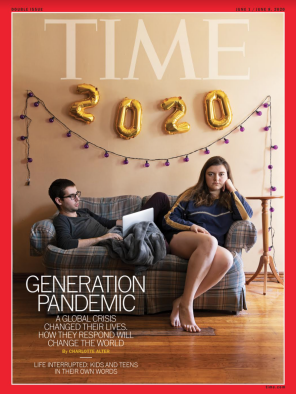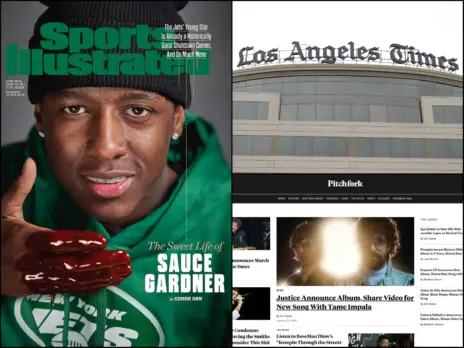
Time remains one of the few big US news businesses not to have been forced to make cutbacks as a result of the coronavirus epidemic.
And Edward Felsenthal, the 97-year-old title’s editor-in-chief and chief executive, is hoping to keep it that way.
On 1 April, Digiday reported that Felsenthal had pledged to staff that the group – owned by billionaire Salesforce boss Marc Benioff and his wife, Lynne, since 2018 – would not make any cuts for 90 days.
With that 90-day mark approaching, Felsenthal still sounds fairly confident when we speak over a Zoom video call (below) in the first week of June.
A third of Time’s revenues come from subscriptions, so – like the New York Times, Washington Post and a few other large publications – it does have some protection from the advertising market slowdown and events business disruption caused by social distancing rules.
“We’re fortunate to have owners who really have a deep belief in the power of the brand – both editorially and as a business,” says Felsenthal. “[They] have a long-term view, expect us to succeed as a business, but also know that there are crises along the way and challenges along the way. And so they’ve stood by us and we’re really grateful for that.”
On the 90-day pledge, Felsental adds: “We still don’t know how long this is going to last and how deep it’s going to be. I haven’t checked the markets in the last six hours, but they seem out of whack with what we know is happening in the world.
“But I think a couple of months ago we really had no idea, and I wanted to assure the team and – to the extent we could – provide some calm in the world that we weren’t going to be rash. We recognised that we didn’t know where it was going and that we weren’t going to do any layoffs for 90 days.
“I’m still not planning any layoffs after 90 days. [I] hope not to do any layoffs after 90 days. Don’t expect to. But I don’t think anybody can tell you what the world is going to look like a year from now.”
‘I think we’ll be in print for a long, long time’
Felsenthal – who hails from Memphis, Tennessee, and attended Harvard Law School before becoming a journalist in 1992 – has been editor-in-chief of Time since 2017. He was given the additional title of chief executive when the Benioffs bought Time from Meredith Corporation for $190m. Meredith had taken ownership of the title in January of that year when it bought Time Inc, the wider publishing group.
Felsenthal started his career at the Wall Street Journal, where he worked in a variety of reporting and editing positions over 15 years. He then went on to help Tina Brown launch news website The Daily Beast before joining Time as digital editor in 2013.
While maintaining a print circulation of around 2m – and regularly attracting media attention for its iconic front pages – Time has also established itself in the online news world.
Its free-to-read website features much content that is unavailable in the magazine and attracted 63m unique visitors in March – far above its recent monthly average of 35m – thanks to its Covid-19 coverage. The digital team also claimed a record 82.7m streams on its video content in March.
On social media, Time has more than 17m followers on Twitter, 9m on Instagram, and nearly 13m likes on Facebook.
“I think for a long time, Time and the other magazines… at Time Inc, there was a stated commitment to digital, and certainly some meaningful efforts to be digital,” says Felsenthal.
“But frankly the print profits were so significant for so long that I think the company suffered from the innovators’ dilemma and there wasn’t really the incentive to go hard at digital. And we’ve been deeply focused on getting out of that headspace.”
Felsenthal estimates that 98 per cent of Time’s audience is now outside of its magazine circulation. But the print product is still important.
“I think we’ll be in print for a long, long time,” he says. “It’s a great experience, this magazine. People who love it, love it. As far as I can see into the future – as I said, we’re nearly 2m subs. Will we be 2m subs? I don’t know. But I think there are many, many years ahead where there’s a significant number of people who like the experience of having and reading a magazine.”

Over its near 100-year history, Time has built a reputation for conjuring the mood of the American nation with its front covers. To mark the coronavirus crisis, the title last month published a special edition called Generation Pandemic (left), which features two young adults sitting at home under quarantine.
Felsenthal explains that what Time wants to deliver to readers is a guide through the health guidelines and implications of Covid-19, tips on how to adjust to the new remote working world, accountability of governments, a celebration of those on the front line dealing with the disease.
“Generation Pandemic doesn’t squarely fit into any of those [categories],” he says. “I was ruminating on the topic, as we all are, just thinking about the impact on my own kids who are 11 and under – three of them.
“What impact is this going to have on them? What are they going to remember? How are they going to be shaped by it? How is the world around them going to be shaped in ways that affect their future? And merging with that the story of people in the class of 2020 in high school and in college.
“We wanted to tell the story of the pandemic through the lens of the young.”
‘It’s a tough moment for the business’
In addition to running Time, Felsenthal is also on the board of the Daily Memphian, a local publication for his hometown that was launched in 2018 to improve the news environment in Tennessee.
Like many others, Felsenthal is concerned about the future of the news business, much of which has been battered by coronavirus.
“The deep irony [is that what] we do is more important than ever, more broadly consumed than ever, but under more threat than ever,” he says.
“The business is very challenging – it’s true for us, true for everybody. Advertising is under tremendous pressure, and most painfully at the local level, where so much of the advertising is local – restaurants, retail, movie theatres – already shrinking and largely wiped out.”
He adds: “It’s a tough moment for the business.”
Felsenthal is also troubled by the treatment of journalists that have been covering protests across the US in recent weeks.
“The role we all play [in] telling truth, and fighting untruth, [is in] a lot of danger,” he says.
“And to see in the last few days the rubber bullets in the eyes of journalists and the violence by police and others towards journalists just in the US… it is a truly, truly a sobering, challenging time in journalism.”
Like many other publications, Time – which traces its history back to 1923 – has tried to make the most of the coronavirus crisis by launching a series of new features, including a new children’s media brand Time For Kids, and Time 100 Talks, where influential people like Dolly Parton are interviewed on video for the magazine’s digital audience.
Felsenthal has also overseen the launch of a new series of interviews with businesspeople called the Leadership Brief. At the end of these interviews, executives are asked to answer some quickfire questions – favourite business book, author, device and app – to help readers learn more about their personal interests.
So, to conclude this interview, we present…
Felsenthal’s favourites
- Journalism book: All The President’s Men and The Publisher (which tells the story of Henry Luce, one of Time’s founders)
- Author: David McCullough
- Device: His smartphone – “an extension of my arm. I’ve tried my Fit Bit – can’t see to make it stick”
- App: Spotify
Email pged@pressgazette.co.uk to point out mistakes, provide story tips or send in a letter for publication on our "Letters Page" blog







